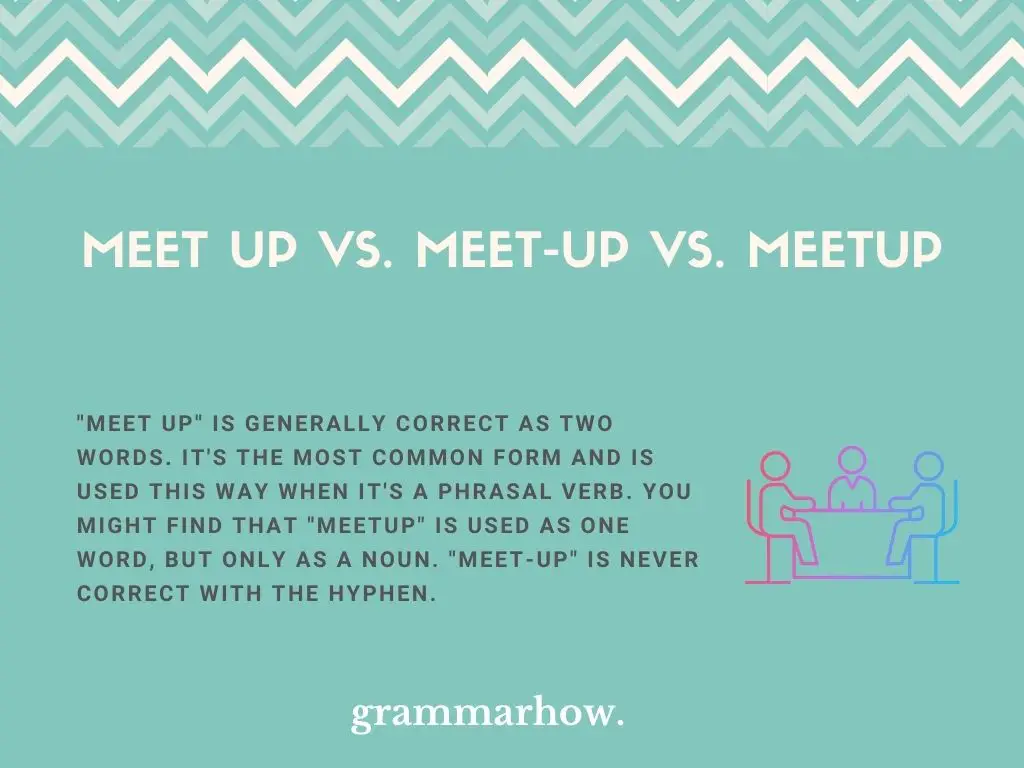Knowing whether “meet up” is one or two words (or hyphenated) can be tricky. There seem to be all kinds of rules to follow when writing words like this. Luckily, they aren’t that challenging once you know the basics. This article will explain those basics.
Meet up vs. Meet-up vs. Meetup
“Meet up” is generally correct as two words. It’s the most common form and is used this way when it’s a phrasal verb. You might find that “meetup” is used as one word, but only as a noun. “Meet-up” is never correct with the hyphen.

According to Google Ngram Viewer, “meet up” is the only choice of the three that gets used often. This shows that it’s the most common one, and you’ll find that most native speakers stick to using it over the others.

If you refer to The Cambridge Dictionary and The Oxford Dictionary, you’ll find entries for “meet up.” It is used as a phrasal verb (and sometimes a noun) in this form.
The Oxford Dictionary also references “meetup” as one word. It says that it’s only correct as a noun to refer to a gathering or group event.
Is “Meetup” One Word?
“Meetup” is used as one word when it is a noun. You can use it when it refers to being a part of a group that is meeting. It used to be a hyphenated form, but the hyphen was dropped in favor of a simpler one-word variation.
The correct word used to be “meet-up,” according to AP Style rules. Hyphens are used in AP Style when they link two or more words together that modify a noun.
Since the difference between “meet” and “up” is clear without the hyphen, it was dropped in favor of simplicity as English evolved.
These examples will shed light on how to use “meetup” in a sentence:
- Will you be attending the meetup later today? I think it would be good for you to meet some people.
- This meetup is going to take forever. I really don’t have the patience to deal with it today.
- I will go to the friendly meetup, but I don’t think I’ll stick around. I’ve got other stuff to do.
- It’s not just a meetup for you. There will be plenty of others there that will have fun.
Is “Meet up” Two Words?
“Meet up” is used mainly as two words. It is correct in this form when you are using a phrasal verb. It means that you will meet up with someone or have previously met someone. “Meet up” should always be kept separate to show that it’s an action.
These examples will help you see how to use “meet up” in a sentence:
- I thought it would be nice for us to meet up with each other once this is all done.
- Are you going to meet up with her? I heard that she was interested in seeing you.
- I’m not here to meet up with anyone in particular. I just want to forget for a second.
- We’re going to meet up with the rest of the crew later. Is that okay with you?
Is “Meet-up” Hyphenated?
You cannot use “meet-up” in the hyphenated form. It used to be correct because you could group the words according to the AP Style guide, but the hyphen was deemed redundant as English evolved. It is no longer used today in writing.
These examples will demonstrate how to use the two correct forms:
- Correct: The meetup went about as well as I expected it to. I have nothing to complain about.
- Incorrect: I thought the meet-up could have gone better. I won’t deny that.
- Correct: She wants to meet up. I’m not sure if I have that in me right now.
- Incorrect: Can we meet-up? I have a few things to ask you.
Tip To Remember The Difference
You can use “meet up” as a phrasal verb. “Meetup” is only ever correct in the noun form (though it’s not nearly as common as “meet up”). It might help to remember the difference with a quick tip.
“Meet up” generally means you are “meeting up with someone.” You should always keep the words separate to show this is the case since you are “meeting” another person. “Meetup” can be grouped since you are part of a group (i.e. “we are a part of a meetup”).

Martin holds a Master’s degree in Finance and International Business. He has six years of experience in professional communication with clients, executives, and colleagues. Furthermore, he has teaching experience from Aarhus University. Martin has been featured as an expert in communication and teaching on Forbes and Shopify. Read more about Martin here.

